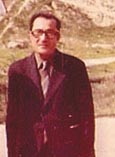Receive Our Newsletter
For news of readings, events and new titles.

stands out among other Iraqi writers as the novelist who has contributed most to the advancement of the Iraqi novel during the 20th century in two respects: its artistic development or refinement and the authentic representation of Iraq’s socio-political life between the 1940s and 1970s.
What is especially remarkable and perhaps unique in the Iraqi context is the fact that all of Farman’s novels were published while he was away from Iraq living in Moscow (during the Soviet Union) from 1960 until his death in August 1990. Some critics maintain that no other Iraqi novelists have thus far matched Farman’s vivid, detailed and realistic portrayal of the period he presented in his novels.
Born in Baghdad into a family of modest income, Farman spent his early years in al-Murabba‘a, a lower and middle-class quarter represented in his first novel The Palm Tree and the Neighbours. Because of his nearsightedness he was denied admission to the famed Higher Teachers Training College attended by other leading Iraqi writers/poets such as Nazik al-Malaika, Badr Shakir al-Sayyab, Lamiah Amarah and Abdel Wahab al-Bayati. Its graduates were normally guaranteed employment in the public sector.
He therefore decided to pursue his education at Cairo [King Fuad] University’s College of Arts (1947–1951), but was forced to return to Baghdad due to health and financial considerations. There he attended the College of Arts of Baghdad University, receiving his BA in 1955.
Excerpted from Salih Altoma's Introduction to the feature on Ghaib Tu‘ma Farma in Banipal 29, Summer 2007
Contributor's Issues